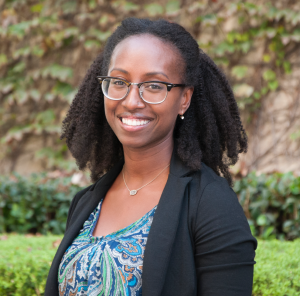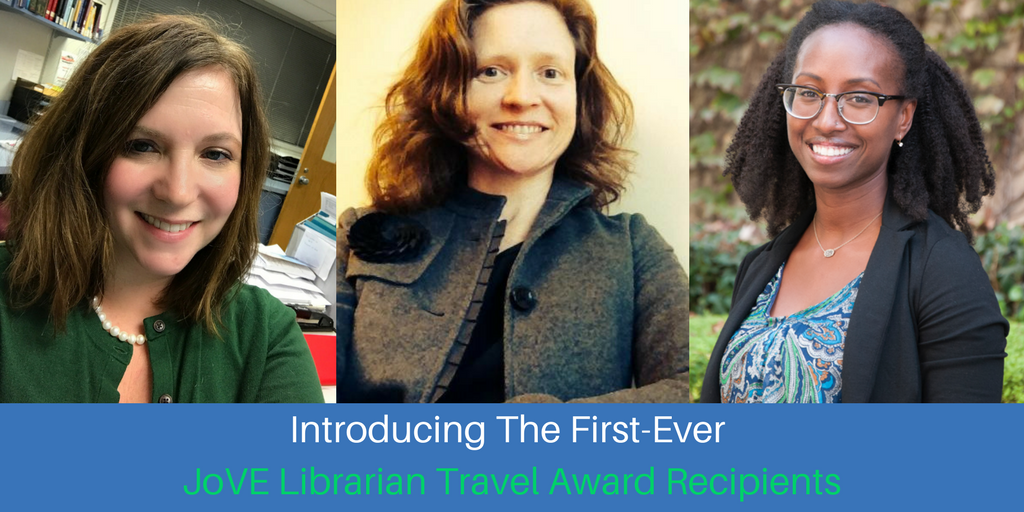On our 10th Anniversary, we announced our Librarian Travel Award to recognize librarians who are leading innovative initiatives to raise awareness of science’s reproducibility crisis. Meet our three award recipients and learn about the work they’re doing to inspire reproducibility-focused programs at your institution!
As JoVE celebrates our 10th Anniversary, we’re highlighting the integral role that librarians play in helping to end the reproducibility crisis in science. For the first time ever, we invited librarians to share their reproducibility-focused initiatives for the chance to win a travel award to attend this year’s MLA Annual Meeting.
Today, we’re happy to recognize three award recipients who are leading this fight with their own initiatives.We caught up with our award recipients to learn more about their work on reproducibility. We hope these insights prove useful and inspire you to submit your own reproducibility initiative for a chance to be recognized with a JoVE Librarian Travel Award. Three more winners will get to attend the Charleston conference in November, and have their winning initiative to improve scientific research reproducibility showcased!
Mellanye Lackey, Eccles Library at the University of Utah

Could you summarize your initiative in a couple sentences?
I am excited to be co-chairing a symposium at MLA on Librarians’ Roles in Research Reproducibility. A keynote, panelists, and an interactive session will educate participants about the issues and let them learn from rock stars in our profession about what they’re doing to stem the reproducibility crisis. At the University of Utah, we’re planning several events over the next year including guest speakers, a week-long, credit-bearing course, and a second research reproducibility conference.
What has been the reaction from your peers and institution to your project?
There has been lots of interest and excitement, as well as growing institutional support for our leadership in this area. We attracted the attention of key administrators at the university and in the health sciences, and they’re very supportive.
Why do you think librarians are uniquely positioned to help raise awareness about the scientific reproducibility crisis? What do they bring to the table that others can’t?
Librarians are connected AND connectors! We build collaborations and partnerships across research enterprises, learning what is important to researchers and administrators so we can provide them with the information they need. We can leverage our knowledge to bring together researchers from different disciplines.
Letisha Wyatt, Ph.D., OHSU Library at Oregon Health & Science University

Could you summarize your initiative in a couple sentences?
My Research Project Workshop series is an initiative designed to address elements of doing research that may not be explicitly covered in formal coursework – aspects of the research process that are typically learned while “on-the-job”. The workshop series addresses topics like research data management (RDM) fundamentals, experimental design, and scientific communication within their work.The topics covered aim to help increase productivity AND strengthen one’s research program.
What role do you see JoVE playing in helping solve the scientific reproducibility crisis? How can JoVE further support your efforts in this area?
I think that JoVE has a special place in helping in the reproducibility crisis by offering a place for scientists to provide the specific technical details that underlie much of our generated data which is hardly ever, if at all, reported in published research studies. I’d also like JoVE to actively encourage authors to submit negative results, make the data available, and have more stringent requirements for methodological details. JoVE can continue supporting librarian initiatives in reproducible research by providing these types of awards. Without it, I may not have been able to attend MLA this year without JoVE’s support.
How will attending the MLA’17 Meeting going to help you raise awareness about the role of librarians in the reproducibility crisis? What are you hoping to gain or accomplish at the conference?
I am curious to see the different ways librarians are working with data or as part of a support team to researchers.It will be a great opportunity to share with others pipeline or on-going initiatives and learn what is working well and what is not. Personally, as a new Librarian, I am hoping to meet other data Librarians and to understand how they are addressing reproducible research at their institutions.
Linda Hasman, Miner Library at the University of Rochester Medical Center

Could you summarize your initiative in a couple sentences?
We’ve taken a multi-pronged approach. We talk about reproducibility when we teach Mastering Scientific Information to our graduate students. Our hope is to teach them these concepts early in their careers so that they will carry them forward. We have created a libguide to keep all of our protocols and methods in one place. Lastly, we have a data management libguide that researchers can refer to for concepts such as file maintenance, naming conventions, and data repositories.
Why did you decide to get personally involved in addressing/discussing the scientific reproducibility crisis?
I came by this by chance, actually. I was preparing lesson plans for a graduate level course called Mastering Scientific Information. I knew that I wanted to include a session on protocols. It was then that I began to learn about the reproducibility crisis and thinking about ways that I could make an impact.
What message would you have for other librarians that might be interested in following your lead in raising awareness on research reproducibility?
My message is that there is a place for librarians to stake a claim in the reproducibility crisis. Librarians can act as agents of change by doing even the smallest things, like creating libguides to curate tools and resources.


